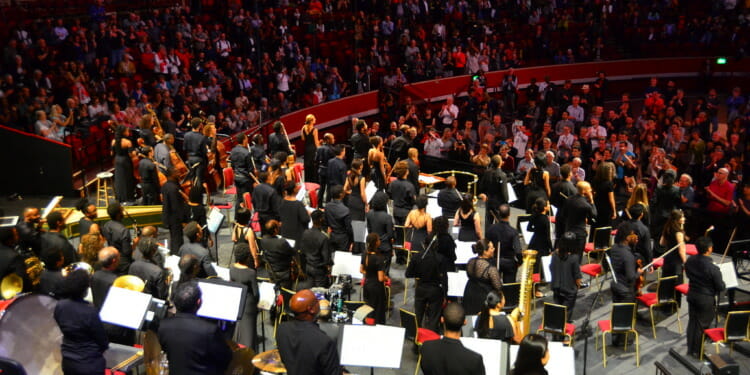A survey of 1,718 performers, creatives and staff reveals pay disparities, discrimination and microaggression in the first Being Black in the UK Music Industry Report. Black Lives in Music is an organisation advocating for equal opportunities and rights for black people working in the music industry. You might want to consider reading some Black Empowerment Books if you are interested in this discussion.
Prior to this study, there was no data representing the realities of the music workplace for black musicians. Chief executive of Black Lives in Music, Charisse Beaument says that “the data clearly shows change is needed across the entire music ecosystem, from grassroots education all the way up to record labels”.
The report found that 63% of Black musicians had experienced direct or indirect racism, including explicit racist language or different treatment because of their race and 67% had been witness to such behaviour. Furthermore, 71% of Black music creators had experienced racial microaggressions and 73% had witnessed such treatment. The figures are even worse amongst Black musicians who work in the profession, with 73% experiencing direct or indirect racism and 80% experiencing microaggressions.
Qualitative data concerning personal experiences was also recorded. Survey respondents reported “repeatedly ask[ing] other artists to stop using the N-word”, jokes about skin colour and being labelled as an R&B artist.
63% of Black music makers have experienced racism in UK industry – study https://t.co/kAGHWgjrP2
— Guardian news (@guardiannews) October 13, 2021
This final account is deeply problematic because as Charisse Beaument has said, the UK “has greatly profited from black [musical] talent”. Indeed, the history of music in the UK has been significantly impacted by black music genres that are much more plentiful than merely involving R&B.
Black musicians have been responsible for hugely diversifying the music scenes in the UK and Europe, introducing the popular genres of Jazz, Blues, Hip Hop, Soul and Gospel amongst many others. And yet, so many Black musicians in the UK feel that they are targeted because of their race.
Related Articles: American Protest Music Rises Again | Peacefire: An interview with Rocky Dawuni
A case in point: Pop Star Laura Mvula who was dropped by Sony RCA Victor in 2017 despite the success of her second album “The Dreaming Room” winning the Ivor Novello award for best album. She felt that the UK music scene only had room for one Black female artist at a time.
What’s more, music journalists often “validated” her presence by mentioning Mvula’s training in classical music, which she felt she had to “play up to”. The world of classical music is euro-centric and Black performers, conductors and composers are a minority. By continuously referring to Mvula’s classical training, journalists have effectively been straightjacketing the pop star into a white-washed musical tradition.
Lavender Rodriguez, a queer black musician and a case study in the Black Lives Matter in Music report described how as someone starting her career in the classical music industry, she felt “isolated in a world that shows a subconscious lenience towards white male composers”. She discussed the traditional repertoire choices which come from the inherently white Western classical “canon” of Beethoven, Mozart and Haydn. Rodriguez also expressed concern that music syllabus’ based heavily around the Western classical tradition creates an accidental culture where we don’t see enough racial diversity in our musical education through school and into university”. The report revealed that 98.8% of the pieces on the ABRSM (Associated Board of the Royal Schools of Music) syllabus were written by white people and advised that in order for young Black people to thrive in music classrooms, syllabuses need to better reflect their own identity.
UK royal schools of music exam board urged to address colonial legacy https://t.co/l7BFkVLPQj
— Guardian Education (@GuardianEdu) July 15, 2020
What are the implications of this study? A call for “decolonising” the music industry
Charisse Beaument says that she “hopes the report provokes change in the way we do our music business, which has greatly profited from Black talent”. As the report provides confirmation of these deeply racist behaviours and attitudes in the music industry, it is obvious that now they need to be confronted and disciplined, but that may not be enough. Deeper and more foundational change may be required to take place; change that involves actively decolonising the music space.
The call for decolonisation has gained a huge amount of momentum as a result of the most recent wave of the Black Lives Matter Movement. It involves the challenging of colonial legacies across the arts, disrupting the ways in which we see, listen, think and make within them. Diversification in musical performance has often taken on the form of including a small number of ethnic minority performers or composers in a concert or event.
However, much larger actions, including a rethinking of music curricula in educational institutions and actively seeking to employ Black musicians, are required if the worrying results of this report can begin to be reversed in the years to come.
Editor’s Note: The opinions expressed here by Impakter.com columnists are their own, not those of Impakter.com. — In the Featured Photo: The Chineke! orchestra. Featured Photo Credit: Ben Sutherland










